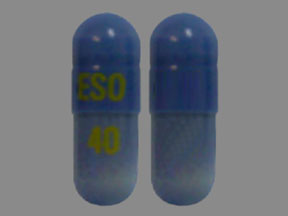
Esomeprazole Magnesium Coupons & Savings Card – Discount Prices from $24.17
Generic for: Nexium, Nexium 24hr, Nexium 24hr clear minis
My prescription
Edit
40MG, Esomeprazole Magnesium (90 Capsule Delayed Releases)
Select pharmacy

CVS
$31.56
COUPON PRICE
Walmart
$24.17
COUPON PRICE
Albertsons
$25.13
COUPON PRICE
Walgreens
$25.13
COUPON PRICEEsomeprazole Magnesium savings card
Show this card to your pharmacist
Walmart
$24.17
BIN
ID
PCN
GRP
019876
LHE43CAC91
CHIPPO
LHX
Powered by
More prescriptions for heartburn
More prescriptions for heartburn
Price history for Nexium (brand) & Esomeprazole Magnesium (generic)
90 Capsule Delayed Releases, 40MG
Average retail price for Nexium
Average retail price for Esomeprazole Magnesium
Average SaveHealth price for Esomeprazole Magnesium
Our price history data is based on aggregated prescription data collected from participating pharmacies in America. Our prescription data updates daily to reflect the latest price changes. If you notice a missing data point, it means there wasn't sufficient data available to generate a monetary value for that date.
We analyzed Esomeprazole Magnesium prices for (40MG, 90 Capsule Delayed Releases) over the last 12 months. The average retail price was $48.63, while the average price using the SaveHealth discount card was $23.63. That's a savings of approximately 51.41% when using our Esomeprazole Magnesium coupon.
Compared to the generic version, Nexium had an average price of $948.49 over the same time period. With the SaveHealth savings card, Esomeprazole Magnesium is 97.51% cheaper on average than Nexium.
*Retail prices are based on pharmacy claims data, and may not be accurate when we don't have enough claims.
Esomeprazole Magnesium dosage forms
Dosage Quantity Price from Per unit 20MG 1 Capsule Delayed Release $2.70 $2.70 20MG 14 Capsule Delayed Releases $5.24 $0.37 20MG 20 Capsule Delayed Releases $6.42 $0.32 20MG 28 Capsule Delayed Releases $7.99 $0.28 20MG 30 Capsule Delayed Releases $8.38 $0.28 20MG 42 Capsule Delayed Releases $10.73 $0.26 20MG 60 Capsule Delayed Releases $14.26 $0.24 20MG 90 Capsule Delayed Releases $26.65 $0.30 20MG 100 Capsule Delayed Releases $28.61 $0.29 20MG 1000 Capsule Delayed Releases $84.70 $0.09
| Dosage | Quantity | Price from | Per unit |
|---|---|---|---|
| 20MG | 1 Capsule Delayed Release | $2.70 | $2.70 |
| 20MG | 14 Capsule Delayed Releases | $5.24 | $0.37 |
| 20MG | 20 Capsule Delayed Releases | $6.42 | $0.32 |
| 20MG | 28 Capsule Delayed Releases | $7.99 | $0.28 |
| 20MG | 30 Capsule Delayed Releases | $8.38 | $0.28 |
| 20MG | 42 Capsule Delayed Releases | $10.73 | $0.26 |
| 20MG | 60 Capsule Delayed Releases | $14.26 | $0.24 |
| 20MG | 90 Capsule Delayed Releases | $26.65 | $0.30 |
| 20MG | 100 Capsule Delayed Releases | $28.61 | $0.29 |
| 20MG | 1000 Capsule Delayed Releases | $84.70 | $0.09 |
| 40MG | 90 Capsule Delayed Releases | $24.17 | $0.27 |
| 40MG | 10 Capsule Delayed Releases | $4.19 | $0.42 |
| 40MG | 20 Capsule Delayed Releases | $5.87 | $0.29 |
| 40MG | 30 Capsule Delayed Releases | $7.56 | $0.25 |
| 40MG | 60 Capsule Delayed Releases | $12.61 | $0.21 |
| 40MG | 100 Capsule Delayed Releases | $25.85 | $0.26 |
| 40MG | 180 Capsule Delayed Releases | $36.81 | $0.20 |
| 40MG | 1000 Capsule Delayed Releases | $84.70 | $0.09 |
